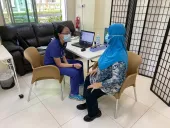
Cyberattacks vs healthcare CEOs
63% of healthcare executives are already tackling data breaches and ethics.
Shields are up for healthcare CEOs as they have begun to actively act against cybersecurity issues, if PwC’s annual global CEO survey is anything to go by.
A whopping 63% of top executives in the healthcare industry are now tackling breaches in data security and ethics, higher than the global average of 43%. Almost half (48%) are taking proactive efforts to address cybersecurity threats despite 61% of them saying that cybersecurity is a key risk to stakeholder trust and another 75% saying they’re deeply concerned about cybersecurity threats. Nine in ten healthcare CEOs believe breaches of data privacy and ethics will affect stakeholder trust in the near term, and 67% said that artificial intelligence and automation will further affect trust levels in the future.
Patrick Figgis, PwC’s global health services leader, says the healthcare industry is still at odds on how to harness its capabilities and mitigate the issues that could arise. “Most healthcare CEOs believe it’s harder for businesses to gain and keep trust in the digital world as data security and ethics have become key risks to stakeholders’ trust,” he explains.
Graeme Pyper, regional director at Gemalto, agrees and adds that the healthcare industry is becoming a popular target for hackers and data thieves. Medical records usually contain payment and billing information, leaving credit card information exposed, but they also often contain information that could enable a hacker to obtain medical services under the victim’s identity and private healthcare insurance benefits.
“In order for healthcare firms to combat ransomware and guarantee the protection of their patients’ data, they must move to a framework that centres on the data itself. Organisations need to provide protection that stays with the data,” Pyper says.













 Advertise
Advertise













